- Home
- Robert Goddard
Fault Line - Retail
Fault Line - Retail Read online
About the Book
A search for missing documents in an international mining company becomes a voyage into dangerous waters.
A dead friend, a lost lover and a clutch of mysteries from Jonathan Kellaway’s youth in Cornwall and Italy in the late 1960s come back to haunt him when he is tasked with discovering why there is a gaping hole in his employer’s records – and to tempt him with the hope that he may at last learn the truth about the tragedies of those years. It is a truth that has claimed several victims before. If he pursues it hard and long enough, he may only add himself to the list.
But pursue it he will. Because the truth, he comes to realize, is the secret that has consumed his life. This time he will not stop… until he has found it.
Contents
Cover
About the Book
Title Page
The Wren Family in July 1968
2010
Chapter One
1968
Chapter Two
Chapter Three
Chapter Four
Chapter Five
Chapter Six
Chapter Seven
Chapter Eight
Chapter Nine
Chapter Ten
2010
Chapter Eleven
1969
Chapter Twelve
Chapter Thirteen
Chapter Fourteen
Chapter Fifteen
Chapter Sixteen
Chapter Seventeen
Chapter Eighteen
Chapter Nineteen
Chapter Twenty
Chapter Twenty-One
2010
Chapter Twenty-Two
Chapter Twenty-Three
1984
Chapter Twenty-Four
Chapter Twenty-Five
Chapter Twenty-Six
Chapter Twenty-Seven
Chapter Twenty-Eight
Chapter Twenty-Nine
Chapter Thirty
Chapter Thirty-One
Chapter Thirty-Two
Chapter Thirty-Three
Chapter Thirty-Four
2010
Chapter Thirty-Five
Chapter Thirty-Six
Chapter Thirty-Seven
Chapter Thirty-Eight
Chapter Thirty-Nine
Chapter Forty
Chapter Forty-One
Chapter Forty-Two
Chapter Forty-Three
The Wren Family in April 2010
Author’s Note
About the Author
Also by Robert Goddard
Copyright
FAULT LINE
Robert Goddard
2010
ONE
I WASN’T A frequent visitor to Presley Beaumont’s office. I wasn’t a frequent visitor to Intercontinental Kaolins’ Augusta HQ at all. For years I’d been a field man, happy to steer clear of head office number-crunching. I remembered IK’s base in Sandersville and preferred it (by a long way) to the anonymous tower of angular steel and tinted glass that was our new centre of operations.
Our new centre? Theirs, I’d soon be able to say. I’d handed in my notice. I was on my way out. Resigning or retiring? You could take your pick. Either way, I was leaving.
But not, apparently, as quickly and quietly as my line manager had led me to expect. He’d supposed – I’d supposed – that my three months’ notice would be waived; that I’d be seen off swiftly with a back-slap and a cheque in lieu: the travelator of working life moving on, with someone else stepping on at the start just as I stepped off at the end.
Then the call had come from the HR director: Beaumont wanted to see me before anything was finalized. There were ‘issues he wanted to address’. What might they be? No point asking. I knew that even as I asked.
I’d worked for Beaumont’s father. A good man. I’d said a few words at his funeral that came from the heart. The son was smoother, smarter, sleeker. I didn’t like him. I certainly didn’t trust him. He probably knew that – though, naturally, neither of us was ever likely to admit as much.
He’d put on some weight since I’d last seen him. But his tailor had kept pace effortlessly. The suit was a work of art, celebrated in shimmering fibre-notes that threw crimson in among the bronze. His smile was broad, his handshake firm. The extra poundage made him look younger than ever, puffing out his babyish complexion. He clearly thought he was looking good.
‘Can we get you some coffee, Jonathan?’ he enquired in an amiable tone.
‘Will I have time to drink it, Presley?’ I countered. ‘I mean, it’s good of you to call me in for a parting word, but I know how busy you are.’
‘There’s time.’ The smile stiffened fractionally. ‘Sit down.’
We took our seats either side of his vast and virtually empty desk. He leant back in his ergonomically over-designed chair and extended an arm to flick an intercom switch. ‘Fix us some coffee, would you, Beth? I believe Jonathan takes his black.’
‘I’m impressed you remember that.’
He smiled. ‘It is impressive, I agree.’
Someone once said to me he thought Presley smiled a lot just to remind you he had teeth. Expensive teeth, by the look of them.
‘I was surprised to hear you were planning to leave us, Jonathan, I surely was.’
‘I turned sixty last October. Time to come in out of the weather.’
‘We could have fixed you up with something less physically arduous here, if that was the problem.’
‘Coast down to retirement behind a desk, you mean?’
‘Exactly. Not one as big as this, of course.’ He chuckled.
‘Naturally not.’
A pause, inching towards awkwardness. Then he said: ‘I heard you’d expressed … reservations … about the Rio Tocaru project.’
Reservations? You certainly could call them that. The Amazon Basin represented the future of Intercontinental Kaolins in particular and the china clay industry in general. It was going to be a bigger source than Georgia and South Carolina. It was already bigger than Devon and Cornwall. But extraction involved deforestation – a lot of it. I’d overseen much of the geological research that had taken IK into Brazil in the first place. I couldn’t deny the part I’d played. But I could end my involvement before any more rain forest was strip-mined out of existence. It was just about all I could do.
‘Not going green in your old age, are you, Jonathan?’
‘Late middle age at worst is how I like to think of sixty.’
‘That’s probably—’
He broke off as Beth entered with the coffee. There was a grinning flurry of three-way small talk as the tray was set down. Then she was gone, leaving Presley to eye me, still smiling, over the rim of his cup.
His expression planted a question in my mind. We’d locked horns a few times over the years. So, were his memories of those times the same as mine? Had he forgotten more than I had – or less? And which of us did the answer hand the advantage to?
‘Any reservations I may have are irrelevant,’ I said, after a cautious sip of coffee. ‘I’m out of the game.’
‘Not yet.’
‘Surely you aren’t going to insist on me working out my notice?’
‘I’m not proposing to insist on anything.’
‘Then … why the summons?’
‘Summons? Is that how it came across?’
‘Pretty much.’
‘Well, I’m sorry. Communications glitch. You know how it is.’
I did know. That was why I didn’t believe there’d been a glitch. ‘Is there something I can do for you, Presley?’ I matched him smile for smile. ‘Before I go.’
‘Not for me.’ He raised his eyebrows and spread his arms expansively, disowning respon
sibility. ‘I’m just the messenger.’
‘And who’s the message from?’
A beat, as he let me wait for his reply. Then: ‘The old man.’
I should have known. There was only one person in Presley’s world he’d be carrying a message for. The old man. Greville Lashley, former chairman, officially retired, yet still not quite out of touch. And he never would be while he lived. Everyone who knew him knew that. And I, for my sins, knew him well.
‘It’s the damnedest thing, Jonathan. I got the word from him to call you on the same day I heard you were leaving us. Seems you’d have got a break from Rio Tocaru anyway. Without having to do anything as drastic as resigning.’
‘Unfortunately, I have resigned. So—’
‘You can wrap this assignment up within a few weeks, that would be my guess. Well, his guess, I should say. I apprised him of your … pending retirement. And he said, “There’s time for him to do one last job for me.” You should be flattered. I got the feeling there’s no one else he’d trust to do it.’
Trust was hard to win from Greville Lashley. And I didn’t fool myself for a minute I’d ever won it. But, then, who had? Maybe that was the point. It wasn’t that there was no one else he trusted. There was just no one else at all. ‘What’s the job?’ I asked warily.
‘Has word reached you about the old man’s vanity project?’
‘His what?’
‘A few months ago, he asked the board to commission a history of the company. Well, both companies until the merger. CCC and NAK.’ Cornish China Clays and North American Kaolins were IK’s forebears. I couldn’t for a moment imagine why Greville should want their corporate paths documented. It would amount, in many ways, to his own professional biography, something I’d have expected him to do his level best to prevent ever seeing the light of day. But maybe, just maybe, extreme old age was chipping away at his reticence. ‘So, we set it up for him. Hired a suitable historian. Fay Whitworth. Doctor Fay Whitworth. Bristol University. Gave her all the access she needed and let her get on with it.’
‘I’ve heard nothing about this.’
‘No. Well, no particular reason you should have, I suppose. She hasn’t touched the NAK side of things yet. Or anything post-merger. To be honest, I’m not sure she ever will. That’s the problem.’
‘Meaning what, exactly?’
Presley’s smile faded. ‘She claims whole chunks of CCC records from the nineteen fifties and sixties have gone missing. They should be in the basement in St Austell – but they aren’t. Anyhow, the perfectionist doctor says she can’t make any further progress without them. She’s effectively gone on strike. The old man wants you to get her back to work.’
‘How?’
The smile was restored. ‘Find the missing records, I suppose. Between you and me, Jonathan, I don’t care whether this history ever gets written or not. But the old man cares. So, we need to look as if we care too.’
‘Maybe you need to, Presley. I don’t see how that applies to me.’
‘Really? You disappoint me.’
‘But I’m sure I don’t surprise you.’
He gave a pained frown, as if baffled by my uncooperative attitude. ‘I’m going to have to insist, Jonathan. It’s in your contract. “Such other duties as the chairman may at his discretion ask you to perform from time to time”. This is one of those times. And you wouldn’t want to put yourself in breach a few months away from your pension, now would you? That would be … kind of stupid, don’t you think?’
It would be stupid, of course. But then chasing after missing company records from forty or fifty years ago didn’t sound very sensible either. Casting my mind back to my earliest involvement with Cornish China Clays, in 1968, I felt a shiver of apprehension. That period was surely a book Greville Lashley should want to keep firmly closed. What was going on inside the old man’s mind? ‘Maybe I ought to talk to Greville about this, Presley.’
In Presley’s eyes there was a gleam of something close to pity. ‘I suggested that myself. He said there was no need. You were just to … deal with the problem as you saw fit. We’ve scheduled a meeting for you with Doctor Whitworth, day after tomorrow. Beth has the details.’
‘The day after tomorrow?’
‘The sooner you go, the sooner you can get the job done and start planning your retirement.’ Presley drained his coffee and glanced at his preposterously bulbous wristwatch. ‘Now, I need to move my day along, so I’m afraid we’re going to have to leave it there. I can tell the old man you’re on the case, can’t I, Jonathan?’
There could be only one answer to Presley’s question. I would be on the case. Not because of a clause in my contract. But because, like Greville Lashley, I’d have trusted no one else to find out what was really going on. I was uniquely qualified for the task, as the old man well knew. And for a host of reasons – many of which he was familiar with – I was bound to accept it. At his contriving, a mystery I thought I’d put behind me had tapped me on the shoulder. And I had no choice, as he must clearly have understood, but to turn and face it.
1968
TWO
MEMORIES ARE MORE than recollected experiences. They’re displacements of ourselves in time and space. They’re events our younger self witnessed and participated in, recalled by an older self who often wonders if he’s truly the same person. They’re visions of people we once knew. And, bewilderingly, we are one of those people.
When I left St Austell Grammar School in July 1968, I was well aware my life was entering a new phase. A new and exciting one, if my hopes for it were to be fulfilled. The world was changing in big, mind-expanding ways. The old order was crumbling. And I liked the sound of what was reputedly replacing it – liberation in every kind of beguiling form.
But in St Austell all that was just rumour – second- or third-hand accounts of glamorous, even dangerous, events far, far away. For first-hand experience, you had to leave. And that was exactly what I was planning to do. A place at LSE awaited me in September. London was where I was confident I’d find everything – including myself.
Ironically, London was where I was actually from. But we’d moved to Cornwall when I was two, so I had no memories of my birthplace. The bank had offered my father a branch managership and west we’d gone. Managership of a bigger branch elsewhere had failed to follow. I could see in him the narrowness of vision his bosses had probably seen too. If he’d ever thought of St Austell as a stepping stone to greater things, he’d stopped thinking that way by the time I was old enough to understand him.
We’d moved into a brand-new three-bedroom semi in Eastbourne Road, between the cemetery and the bypass, on the southern edge of town. Sixteen years later, we were still there, or at least Mum and Dad were. In my mind, I was already packed and ready to go. Dad had tried gently to steer me towards engineering or geology degree courses, on the grounds they would help me get a job in the china clay industry back in Cornwall after I’d graduated. I’d opted for economics because a job in the china clay industry was the last thing I aspired to. I didn’t want to think about returning to Cornwall. I wanted to think about getting out and staying out.
As a child, I believed the spoil heaps on the horizon north of St Austell were natural formations. Later I understood that St Austell’s hinterland was entirely man-made: a weird, out-of-scale moonscape of vast pits worked by huge machines that looked no bigger than my Dinky toys when seen from above; of conical waste mountains dwarfing the terraces of labourers’ cottages; of gleaming blue-green lakes in flooded pits and drying sheds as big as cathedrals; of long, lumbering trainloads of clay trucks heading for Par Docks while Mum and Dad and I sat in the Morris Minor at the level crossing in St Blazey, watching them slowly pass. The china clay blew in storms of fine dust on dry, windy days, or flowed in milky slews of mud on wet ones. It curdled the rivers and bleached the land. It was everywhere.
It was also every other local resident’s employer. St Austell wasn’t just a china clay town. It was the c
hina clay town. The industry was dominated by one company, Cornish China Clays, operating out of a large, newly built headquarters easily visible from the playing fields of the grammar school. While I was in the sixth form, we were taken to see the wonders of their IBM computer and tour their research laboratories. We met assorted science graduates recruited from all over the country. The message was clear: this was a modern, efficient, innovative business we should think seriously about getting involved in. Absolutely. Just a pity it was in St Austell. Where I had no intention of remaining.
A summer job with CCC sounded too much like being sucked in to me, so, to raise money for the wild time I was determined to have in London, I looked elsewhere. Walter Wren & Co. were a china clay firm right enough, but much smaller and older-fashioned than CCC. And their advert in the Cornish Guardian made it clear the vacancy in their office was menial and temporary – the perfect combination, as far as I was concerned. Two months would suit them as well as me. I started the job ten days after the end of term.
Wren’s operated out of dilapidated premises in East Hill. Not only were there no research labs or computers, there was little sign that anything much had changed since before the war. Maurice Rowe, the lugubrious, chain-smoking head of accounts I was at the beck and call of, informed me before the end of my first week that the company would be swallowed by CCC sooner or later, so the directors saw no sense in investing in new equipment or procedures. ‘We’re not exactly what you’d call go-ahead.’
That was a serious understatement. The accounts office functioned on manual typewriters, double carbon copies and wooden filing cabinets. It was fortunate for me I didn’t have to spend all day every day there choking on Rowe’s cigarette smoke. There were errands to be run at the so-called shipping office, attached to the firm’s drying shed near the harbour a mile away at Charlestown. I never had to be asked twice to take the van down there. The place was every bit as antiquated as East Hill, but livelier, thanks to all the loading and unloading that went on around it.
Par Docks was CCC territory, so Wren’s and a few other small firms used Charlestown for their shipments. There was no rail access, the harbour was tiny and facilities hadn’t been upgraded since the village was built by local landowner Charles Rashleigh at the end of the eighteenth century. But it was a pretty spot when the sun shone and the sea sparkled. I spent as much time there as I could contrive. Jim Turner, the shipping manager, cordially hated Maurice Rowe, so took pleasure in keeping me hanging around. And I never put up much resistance.

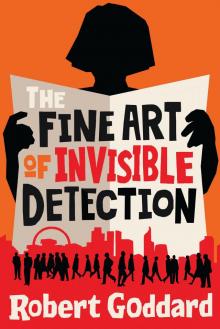 The Fine Art of Invisible Detection
The Fine Art of Invisible Detection One False Move
One False Move Panic Room
Panic Room Beyond Recall
Beyond Recall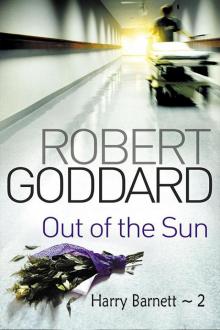 Out of the Sun
Out of the Sun In Pale Battalions - Retail
In Pale Battalions - Retail Painting The Darkness - Retail
Painting The Darkness - Retail The Corners of the Globe
The Corners of the Globe Name To a Face
Name To a Face Closed Circle
Closed Circle Caught In the Light
Caught In the Light Into the Blue
Into the Blue Past Caring - Retail
Past Caring - Retail Past Caring
Past Caring Hand In Glove - Retail
Hand In Glove - Retail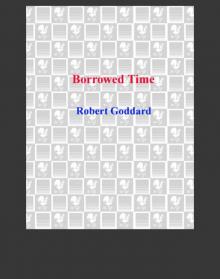 Borrowed Time
Borrowed Time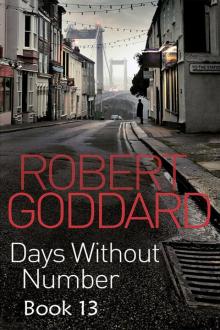 Days Without Number
Days Without Number James Maxted 03 The Ends of the Earth
James Maxted 03 The Ends of the Earth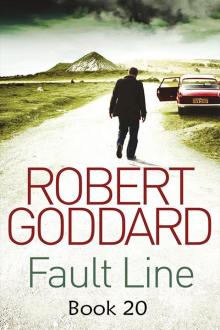 Fault Line - Retail
Fault Line - Retail Play to the End
Play to the End Sea Change
Sea Change Never Go Back
Never Go Back Take No Farewell - Retail
Take No Farewell - Retail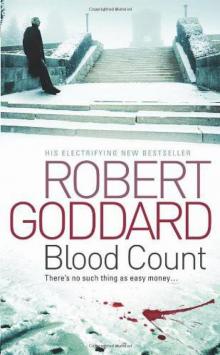 Blood Count
Blood Count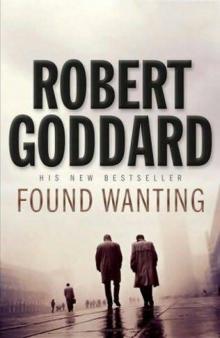 Found Wanting
Found Wanting Sight Unseen
Sight Unseen Hand in Glove
Hand in Glove The Ways of the World
The Ways of the World